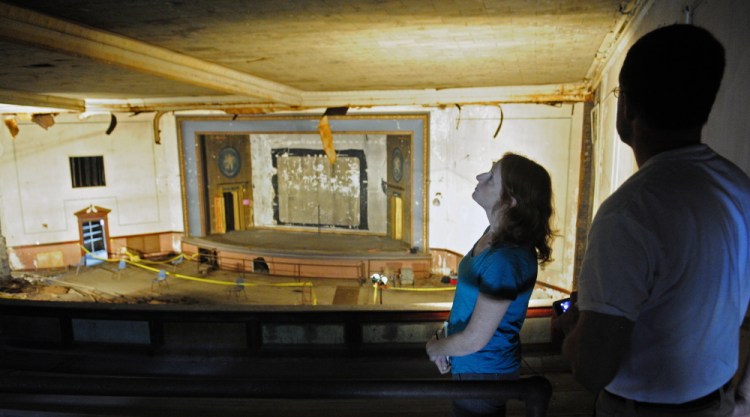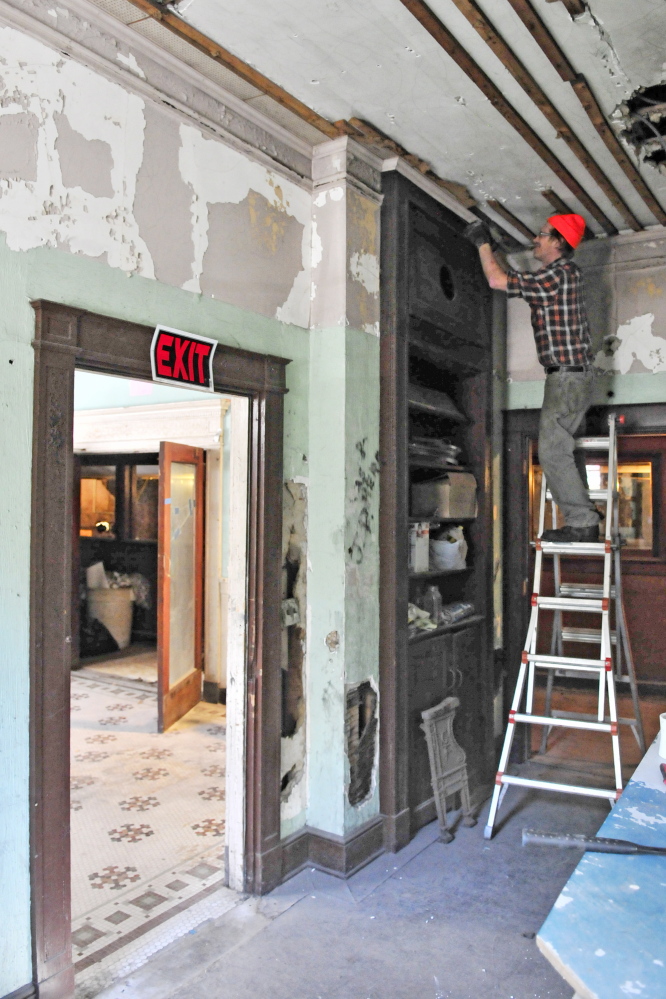AUGUSTA — The Colonial Theater, beloved by many but neglected for years, now has national historic backing that could open up the door to sought-after preservation money.
The Water Street theater, which was last used as a movie house in 1969 and has been unoccupied since then, was added to the National Register of Historic Places earlier this month. A group working to restore the former movie house says the designation allows it the opportunity to tap into federal and state historic preservation tax credits and seek grants designated for historic properties.
Group leaders say they’ll probably seek about $2 million in tax credits to help fund the restoration project, which is estimated to cost between $3 million and $6 million.
“It is an absolute milestone,” Richard Parkhurst, a developer and a leader of efforts to restore the downtown theater, said of the designation. “I’m just thrilled; it opens up all kinds of avenues for us. And it establishes that it really is a viable, historic property.”
Christi Mitchell, an architectural historian with the Maine Historic Preservation Commission, which prepared the application to have the theater listed nationally, said the commission approved the nomination in July. The building is historically significant as the last surviving movie theater in downtown Augusta and, as the application for the designation states, “as an eclectic example of early twentieth (century) design by a noted architect in downtown Augusta and … in recognition of the establishment’s lengthy significance as the town’s most important cinema.”
The theater was built in 1913 to replace an earlier movie house that burned down and was designed by Harry S. Coombs, one of Maine’s most well known architects at the time, who also designed many area libraries. The Augusta building was rebuilt and expanded after another fire in 1926, but recent work has determined much of the building’s original facade survived that fire and many aspects of Coombs’ design remain, according to the application.
Mitchell agreed with Parkhurst that the national historic designation is necessary for the building’s would-be saviors to be able to use historic preservation tax credits to help finance its rehabilitation. The building is owned by a nonprofit organization, Augusta Colonial Theater Inc.
Parkhurst said advocates for the building are working with University of Maine at Augusta architecture students to draft conceptual drawings of how the theater could be refurbished, which will allow them to determine a budget for construction costs and a business plan that could help attract grants and other funding.
There’s no set plan for what the building would be used for, but Parkhurst said it’ll probably involve showing movies and having live performances including regular theater group performances. He said theater advocates also are looking to work with any local cultural or performing arts groups, such as the Augusta Symphony Orchestra, which might be interested in partnering to put on performances at the Colonial.
He said local fundraising hasn’t really gotten underway yet, but will need to occur for the project to continue moving forward.
Steve Pecukonis, downtown manager and executive director of the Augusta Downtown Alliance, said a restored, functioning theater operation in the Colonial building would be a boon to downtown.
“A restored and operational Colonial Theater would be a major draw for the entire downtown and would really ignite, I think, a revitalization on that northern end of Water Street which, frankly, hasn’t seen as much development as the southern end has,” Pecukonis said. “It would bring groups of people downtown for meetings, performances, shows. … Just the idea we could bring people into this community several nights a week to eat in our restaurants, shop in our stores and have a drink in our lounges would have a big impact downtown — about as big as I could imagine right now.”
Pecukonis said the theater is the 13th building in downtown Augusta to be listed on the National Register of Historic Places and the 41st building or historic district in Augusta to make the registry listing.
He said cultural and historic tourism is a growing trend in the United States, and having another designated historic structure downtown could help draw some of the growing group of tourists who travel in pursuit of history and culture.
“We know people who participate (in cultural tourism) tend to be older, more affluent and tend to spend money in the communities they visit,” Pecukonis said. He added Augusta is working with other Kennebec River corridor communities to market the area as a historical tourism destination.
Augusta Downtown Alliance board members also have been working with city officials to begin the process of having the city’s entire downtown area designated as an historic district.
The theater has been open for tours Saturdays all summer, but Parkhurst said the last walk-through will be this Saturday, as the building will be closed for the winter. He said volunteer work days will continue through the winter, probably either Tuesdays or Wednesdays.
During the winter, the lobby will be refurbished with new paint and windows, courtesy of O&P Glass, an Augusta business owned by Parkhurst’s family, according to Parkhurst.
“So when we open back up in the spring, we’ll have a refurbished lobby, and we’ll have more formalized tours,” Parkhurst said.
Mitchell said simply being listed on the National Register of Historic Places does not require building owners to follow federal historic preservation guidelines strictly if they wish to renovate or modify their buildings. However, if renovations to a building on the register would either use federal funding or require a federal permit or license, that could trigger restrictions on how the building could be modified.
The application to place the Colonial Theater on the national registry notes it was built in 1913 to replace Augusta’s first movie theater, the Comique, which was built on the same site between 1903 and 1910. Initially it showed silent films and had an orchestra pit in front of the stage. At some point the stage was extended over the orchestra pit, and a sound system capable of playing audio for movies was added sometime shortly after World War I.
The Colonial Theater ceased operation in 1969. The following year, a cinema opened at a shopping center on Western Avenue.
Keith Edwards — 621-5647
kedwards@centralmaine.com
Twitter: @kedwardskj
Send questions/comments to the editors.




